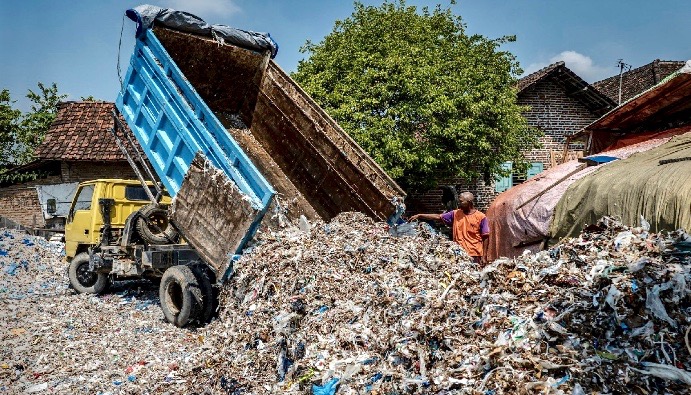NATASHA VASS WRITES – What happens to your trash once you throw it in the bin? It’s no longer in front of you, so why think about it? For Indonesians, this set of circumstances could not be further from the truth. 85% of the trash produced by Indonesians is not recycled. In fact, Indonesia is now the trash bin of the West.
Historically, countries like the United States, Australia, and the United Kingdom have been transporting their waste to developing nations, creating a transoceanic waste trade in which the garbage is sorted, properly disposed or recycled. The main function of this trade is to provide resources for industries to use, specifically paper. Yet aluminum cans, plastic bottles, and used diapers are often found in the mix. The United States alone exported 452,000 tons of waste in 2018 to Indonesia.
The reality is that most garbage ends up littering villages, poisoning oceans, or releasing detrimental emissions in the air through the popular practice of burning. As the 2nd largest oceanic polluter of plastic and the 12th highest producer of CO2, there is no question that Indonesia has a serious environmental problem. And nature is not the only element suffering.
In Tropodo, detrimental chemicals from trash have managed to seep into the food supply. Tofu factories located in the village need paper and plastic, which are cheap and easily accessible, to be burned for fuel. Although this is a quick way to produce profitable tofu, the exposure to chemicals can cause cancer and infertility.
The International Pollutants Elimination Network (IPEN) tested eggs produced by free-range chickens that live among the piles of trash. It found that levels of toxic dioxins were 25 times greater than that which is acceptable by US safety standards. Now Indonesia, a nation with extreme poverty, faces possible food insecurity.
To make matters worse, the waste trade has benefited villagers. In Bangun, scrap dealers push for the import of trash because it generates profit. High imports villagers make around $8 per day – a desirable amount compared to the possible $1. The short-term human profits trump the long-term environmental and biological consequences.
Waste, then, is no longer just an environmental problem, but one that threatens people’s health. In our search for sustainable solutions, we cannot purely focus on reducing emissions. We must consider harm to humans, create employment opportunities, uncover ways to preserve the environment and promote practices that protect the wellbeing of the less fortunate.
To understand the natural world, we have to understand the social world in which we live. People of the West love to advocate for the environment, but next time you throw something in the recycling bin, ask yourself… where is this going to end?

